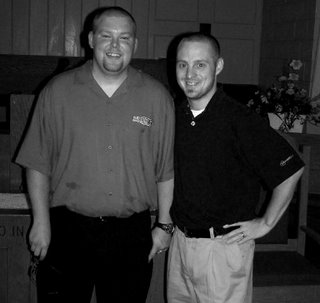I will make this as painless as possible, that's all I can promise. But every once in a while I morph into teaching mode, and I have to let it flow.
Spending the past few days at our [un]denomination's convention deserves an update, but I have to explain more than my intinerary. So I'm gonna drop a two-parter on you. Part one will deal with the history of our churches. I'm a hack historian, so bear with me. It's hard to conceptualize our convention if you first don't understand why it originally started.
Part two will cover my experiences this past week. So if you're not feeling academic, part two will be for you. You might want to skip this.
Still here? Then here we go . . .
So the church I grew up in is known as the Independent Christian Churches/Churches of Christ [put that on a business card]. Our movement started in the early 1800's with a group of people not wanting to deal with denominational hierarchy and longing for a return to Biblical authority. Two groups with similar thinking on these issues merged in Lexington, Kentucky to form what would be called the Stone-Campbell Movement [After Barton Stone and Thomas & Alexander Campbell, the leaders of the two streams] or, within or churches, The Restoration Movement. These churches maintained a loose connection, and prospered for almost 100 years.
At the turn of the twentieth century some issues within the Movement began to cause a stir. Some in the Restoration Movement were more dogmatic than others in certain doctrines. They held tightly to the concept that where there Scriptures speak, we should speak, and where they're silent, we should be silent. This faction believed that using musical instruments during worship was not Biblical and refused to use them. Also, some abhorred the concept of newly formed missionary societies- parachurch organizations that acted on behalf of many churches. This too wasn't mentioned in Scripture. While the tremors of this split had more to do with the aftermath of the Civil War, these theological differences are usually blamed for the parting. In 1906, 100 years ago, the US Census first listed the Churches of Christ non-instrumental as a different church than the mainstream Disciples of Christ/Christian Churches. So one movement was now two branches.
It wasn't very long that another issue arrived that would cause dissension. Liberalism encouraged a higher textual criticism that usually resulted in people questioning the validity of the Scriptural story. Incidents from the Bible once accepted as fact could now be called metaphor. Liberalism ended up causing a rift among many denominations, but it split the Disciples/Christian Churches in half. The Disciples of Christ adhered to liberalism, while the Christian Churches maintained a fundamental view point. So one movement was now three branches.
So for those keeping track at home:
The ultra-conservative branch is the Churches of Christ non-instrumental.
The moderate branch is the independent Christian Churches/Churches of Christ
The liberal branch is the Disciples of Christ/Christian Church.
Good thing this isn't confusing. Sometimes I wish they would've come up with new names, so they didn't overlap. For instance, I grew up at a Church of Christ [instrumental] that recently purchased the building of a Church of Christ [non-instrumental]. And Echo is a Christian Church [moderate] renting from a Christian Church [liberal]. New names would've been a great help. Why not rename the three branches Larry, Moe, and Curly? Our churches are so Curly. Yet I digress . . .
All these splits required new seminaries and organizations to develop for each group. For instance, Lexington's College of the Bible [now Lexington Theological Seminary] became a Disciples school, so a group of individuals started the Cincinnati Bible Seminary [my alma mater] in 1924. And then in 1927, the independent Christian Churches convened for the first time at, what would be called the North American Christian Convention.
And we still gather almost 80 years later.
This particular convention, since it marks 100 years from the original split of the movement, has focused on reconciliation with the non-instrumental churches. Many of these churches aren't as dogmatic about the instrumental issue which is the main theological barrier between the groups. I'm not sure what the outcome of this week will be, but it is a great opportunity for two groups at odds for a hundred years to gather and worship together.
And as for our convention, it's just a big family reunion. No votes are take, no official policies are discussed. Just Biblical preaching and people who share a common vision.
The independent Christian Churches/Churches of Christ: we put the "mental" in instrumental.





